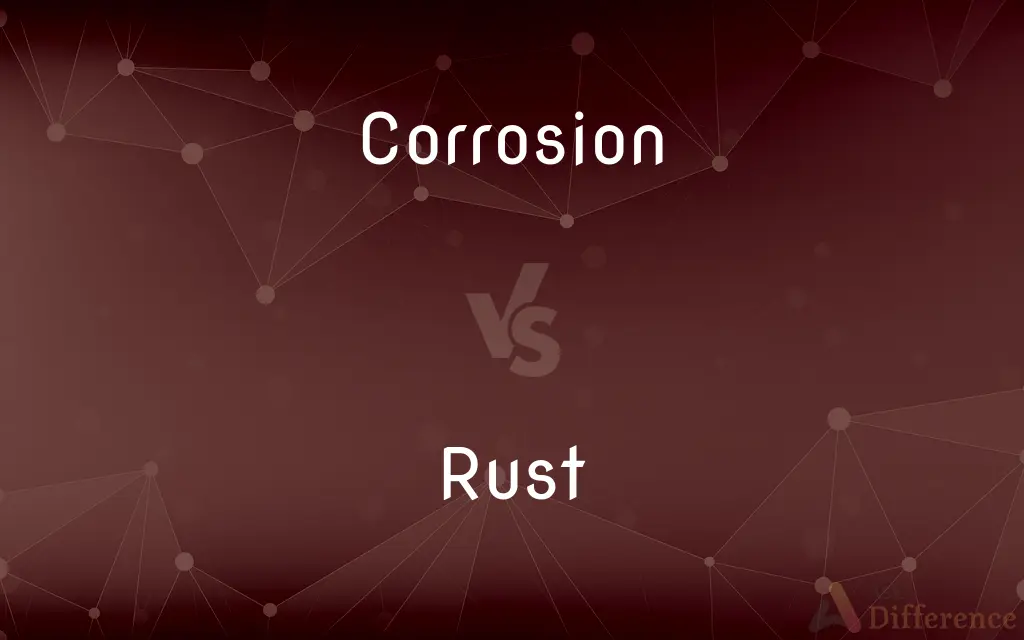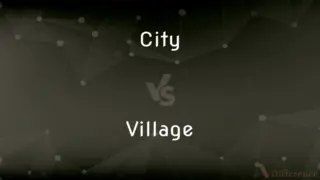Corrosion vs. Rust — What's the Difference?
By Tayyaba Rehman & Maham Liaqat — Updated on March 9, 2024
Corrosion is a broad term for the degradation of materials due to chemical reactions, often involving metals and environmental factors, while rust specifically refers to the corrosion of iron or iron alloys resulting in reddish-brown oxides.

Difference Between Corrosion and Rust
Table of Contents
ADVERTISEMENT
Key Differences
Corrosion is a natural process that leads to the gradual destruction of materials, usually metals, by chemical reactions with their environment. It can occur in various forms, such as electrochemical corrosion in metals, or as degradation in non-metals like polymers and ceramics. Rust, on the other hand, is a specific type of corrosion that affects iron and its alloys, forming a distinct reddish-brown oxide on the surface.
While corrosion can affect a wide range of materials, including metals, ceramics, and polymers, and can be caused by various environmental factors such as oxygen, water, acids, and salts, rust is specifically the result of the reaction between iron, oxygen, and moisture. This reaction leads to the formation of iron oxides, which are typically red or orange in color.
The process of corrosion can be influenced by many factors, including the material's composition, environmental conditions, and the presence of protective coatings or inhibitors. Rusting, as a form of corrosion, is particularly influenced by the presence of water and oxygen, making iron and its alloys more susceptible to degradation in humid or marine environments.
Corrosion can lead to significant material and structural damage, affecting the durability and lifespan of components and structures. It is a concern in various industries, from construction to electronics. Rust specifically weakens iron and steel structures, causing aesthetic and structural damage that can lead to failures if not properly managed.
Preventing or controlling corrosion involves various strategies, such as material selection, environmental control, and the application of coatings or cathodic protection. Rust prevention for iron and steel often includes the use of paints, galvanization, and corrosion inhibitors to create barriers against moisture and oxygen.
ADVERTISEMENT
Comparison Chart
Definition
The chemical or electrochemical process leading to the deterioration of materials due to environmental interactions.
A specific type of corrosion that results in the formation of iron oxides on iron and its alloys.
Affected Materials
Metals, ceramics, polymers, and more.
Specifically iron and iron-based alloys.
Causes
Various environmental factors like oxygen, moisture, acids, and salts.
Mainly oxygen and moisture in the presence of iron.
Visual Indicators
Can vary widely depending on the material and type of corrosion.
Characterized by a distinctive reddish-brown flaky coating.
Prevention Methods
Material selection, protective coatings, environmental control, cathodic protection.
Paints, galvanization, corrosion inhibitors, environmental control.
Compare with Definitions
Corrosion
The gradual destruction of materials by chemical reactions with their environment.
The statue's bronze surface showed signs of corrosion from years of exposure to acidic rain.
Rust
Specifically affects iron-based materials, weakening them over time.
The iron gate's strength was compromised by extensive rusting at its joints.
Corrosion
A process that can affect various materials, leading to their degradation.
Corrosion in the pipeline was caused by prolonged exposure to salty sea air.
Rust
The formation of reddish-brown iron oxides on iron or steel due to oxygen and moisture.
The neglected garden tools were covered in rust after being exposed to rain.
Corrosion
Can be accelerated by factors like moisture, temperature, and chemical exposure.
The chemical plant's equipment experienced rapid corrosion due to constant exposure to harsh chemicals.
Rust
Visible as a flaky and porous layer on the metal's surface.
The car's undercarriage showed significant rust, indicating long-term exposure to moisture.
Corrosion
Often involves the formation of oxides, sulfides, or other compounds on the material's surface.
Corrosion on the metal bridge formed a layer of rust, signaling the need for maintenance.
Rust
Rust is a common concern for structures and objects made of iron and steel.
Regular inspection for rust is essential to maintain the integrity of the steel bridge.
Corrosion
Controlled through methods like coatings, material choices, and environmental adjustments.
The use of stainless steel in marine applications helps prevent corrosion.
Rust
Prevented using coatings, galvanization, or environmental control.
The bridge was painted to protect its steel structure from rust.
Corrosion
Corrosion is a natural process that converts a refined metal into a more chemically stable form such as oxide, hydroxide, carbonate or sulfide. It is the gradual destruction of materials (usually a metal) by chemical and/or electrochemical reaction with their environment.
Rust
Rust is an iron oxide, a usually reddish-brown oxide formed by the reaction of iron and oxygen in the catalytic presence of water or air moisture. Rust consists of hydrous iron(III) oxides (Fe2O3·nH2O) and iron(III) oxide-hydroxide (FeO(OH), Fe(OH)3), and is typically associated with the corrosion of refined iron.
Corrosion
The act or process of corroding.
Rust
Any of various powdery or scaly reddish-brown or reddish-yellow hydrated ferric oxides and hydroxides formed on iron and iron-containing materials by low-temperature oxidation in the presence of water.
Corrosion
The condition produced by corroding.
Rust
Any of various metallic coatings, especially oxides, formed by corrosion.
Corrosion
A substance, such as rust, formed by corroding.
Rust
A stain or coating resembling iron rust.
Corrosion
The act of corroding or the condition so produced.
Rust
Deterioration, as of ability, resulting from inactivity or neglect.
Corrosion
A substance (such as rust) so formed.
Rust
Rust fungus.
Corrosion
(chemistry) Erosion by chemical action, especially oxidation.
Rust
A plant disease caused by a rust fungus, characterized by reddish or brownish spots on leaves, stems, and other parts.
Corrosion
(by extension) The gradual destruction or undermining of something.
Rust
A strong brown.
Corrosion
The action or effect of corrosive agents, or the process of corrosive change; as, the rusting of iron is a variety of corrosion.
Corrosion is a particular species of dissolution of bodies, either by an acid or a saline menstruum.
Rust
To become corroded.
Corrosion
A state of deterioration in metals caused by oxidation or chemical action
Rust
To deteriorate or degenerate through inactivity or neglect
My golf game has rusted from all those years of not playing.
Corrosion
Erosion by chemical action
Rust
To become the color of rust.
Rust
(Botany) To develop a disease caused by a rust fungus.
Rust
To corrode or subject (a metal) to rust formation.
Rust
To impair or spoil, as by misuse or inactivity.
Rust
To color (something) a strong brown.
Rust
The deteriorated state of iron or steel as a result of moisture and oxidation.
The rust on my bicycle chain made cycling to work very dangerous.
Rust
A similar substance based on another metal (usually with qualification, such as "copper rust").
Aerugo. Green or blue-green copper rust; verdigris. (American Heritage Dictionary, 1973)
Rust
A reddish-brown color.
Rust
A disease of plants caused by a reddish-brown fungus.
Rust
(philately) Damage caused to stamps and album pages by a fungal infection.
Rust
(intransitive) To oxidize, especially of iron or steel.
The patio furniture had rusted in the wind-driven spray.
Rust
(transitive) To cause to oxidize.
The wind-driven spray had thoroughly rusted the patio furniture.
Rust
(intransitive) To be affected with the parasitic fungus called rust.
Rust
To (cause to) degenerate in idleness; to make or become dull or impaired by inaction.
Rust
(intransitive) Of a black cat or its fur, to turn rust-coloured following long periods of exposure to sunlight.
It's very common for black cats to rust during the summer.
Rust
The reddish yellow coating formed on iron when exposed to moist air, consisting of ferric oxide or hydroxide; hence, by extension, any metallic film of corrosion.
Rust
A minute mold or fungus forming reddish or rusty spots on the leaves and stems of cereal and other grasses (Trichobasis Rubigo-vera), now usually believed to be a form or condition of the corn mildew (Puccinia graminis). As rust, it has solitary reddish spores; as corn mildew, the spores are double and blackish.
Rust
That which resembles rust in appearance or effects.
Sacred truths cleared from all rust and dross of human mixtures.
Rust
To contract rust; to be or become oxidized.
If gold ruste, what shall iron do?
Our armors now may rust.
Rust
To be affected with the parasitic fungus called rust; also, to acquire a rusty appearance, as plants.
Rust
To degenerate in idleness; to become dull or impaired by inaction.
Must I rust in Egypt? never moreAppear in arms, and be the chief of Greece?
Rust
To cause to contract rust; to corrode with rust; to affect with rust of any kind.
Keep up your bright swords, for the dew will rust them.
Rust
To impair by time and inactivity.
Rust
A red or brown oxide coating on iron or steel caused by the action of oxygen and moisture
Rust
A reddish-brown discoloration of leaves and stems caused by a rust fungus
Rust
The formation of reddish-brown ferric oxides on iron by low-temperature oxidation in the presence of water
Rust
Any of various fungi causing rust disease in plants
Rust
Become destroyed by water, air, or an etching chemical such as an acid;
The metal corroded
The pipes rusted
Rust
Cause to deteriorate due to the action of water, air, or an acid;
The acid corroded the metal
The steady dripping of water rusted the metal stopper in the sink
Rust
Become coated with oxide
Rust
Of the color of rust
Common Curiosities
Can corrosion occur without water?
Yes, corrosion can occur in dry environments, especially if there are other corrosive substances like acids or gases present.
Can non-metal materials experience corrosion?
Yes, non-metal materials like polymers and ceramics can also undergo degradation processes that are analogous to corrosion in metals.
Why is rust red or brown?
Rust is red or brown due to the formation of hydrated iron(III) oxides, which have a distinctive reddish-brown color.
What is the main difference between corrosion and rust?
Corrosion is a broad term for the degradation of materials, while rust specifically refers to the corrosion of iron and its alloys resulting in iron oxides.
Is rust harmful to all types of metals?
Rust specifically affects iron and its alloys, such as steel, but other metals can experience their forms of corrosion.
What is the most effective way to prevent rust?
The most effective way to prevent rust is by providing a barrier to moisture and oxygen, such as through painting, galvanization, or the use of corrosion inhibitors.
Does stainless steel rust?
Stainless steel is more resistant to rust due to the presence of chromium, which forms a protective oxide layer, but it can rust under certain conditions.
Can painted metals rust?
Painted metals can still rust if the paint layer is damaged, allowing moisture and oxygen to reach the metal surface.
What role does saltwater play in corrosion?
Saltwater accelerates corrosion, especially in metals, by conducting electricity and facilitating electrochemical reactions.
Can corrosion be completely stopped?
While it's difficult to stop corrosion entirely, it can be significantly slowed or controlled through proper material selection, design, and protective measures.
Why is rust a concern for infrastructure?
Rust weakens iron and steel structures, posing safety risks and requiring costly maintenance or replacements.
Can rust be removed once it has formed?
Rust can be removed through mechanical (e.g., sanding, grinding) or chemical (e.g., rust converters, acids) methods, but the underlying metal may still be weakened.
Is rusting a quick process?
Rusting can occur over various timeframes, depending on environmental conditions and the material's protective measures.
How does temperature affect corrosion?
Higher temperatures generally accelerate corrosion by increasing the rate of chemical reactions.
What is galvanization in the context of rust prevention?
Galvanization involves coating iron or steel with a layer of zinc, which protects the metal from rust by acting as a sacrificial anode.
Share Your Discovery

Previous Comparison
City vs. Village
Next Comparison
Algebra vs. CalculusAuthor Spotlight
Written by
Tayyaba RehmanTayyaba Rehman is a distinguished writer, currently serving as a primary contributor to askdifference.com. As a researcher in semantics and etymology, Tayyaba's passion for the complexity of languages and their distinctions has found a perfect home on the platform. Tayyaba delves into the intricacies of language, distinguishing between commonly confused words and phrases, thereby providing clarity for readers worldwide.
Co-written by
Maham Liaqat














































